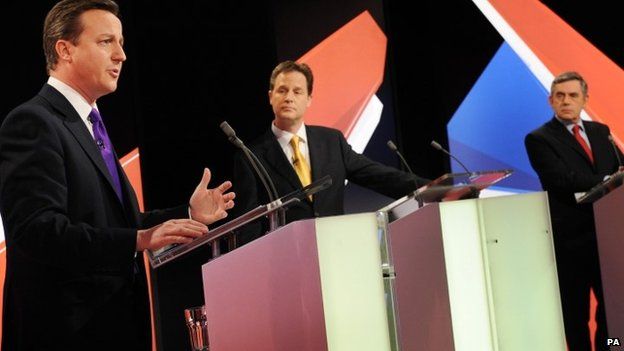Election 2015: Northern Ireland parties want debate say
- Published

Political parties in Northern Ireland are demanding they be included in TV election debates before the election.
The Democratic Unionist Party said it would be "grossly unfair" to invite the SNP and Plaid Cymru but leave them out.
Sinn Fein, the SDLP and Alliance Party have all said they should take part.
The broadcasters are reportedly offering to stage two seven-way debates with the Conservatives, Labour, the Lib Dems, UKIP and the Greens as well as the two nationalist parties.
The BBC, ITV, Sky News and Channel 4 have reportedly revised their plans for the debates after David Cameron refused to take part without the Green Party.
Analysis by political correspondent Iain Watson
Fans of the BBC Four political drama Borgen will know all about the risks for more high-profile politicians inherent in a live televised debate.
In a cringeworthy scene, the former PM Birgitte Nyborg crashes and burns under questioning, while some of her rivals make their names.
It's the stuff of nightmares for political leaders.
So it's perhaps not surprising that David Cameron's advisers believe he has the most to lose from participation in any general election debates.
The broadcasters - or some of them at least - neither wanted to pull the debates entirely nor "empty-chair" a prime minister.
So they have gone out of their way - possibly at the expense of an engrossing spectacle for viewers - to accommodate his stated desire to include the Greens in any line-up.
With the SNP and Plaid Cymru also invited to take part, it's just possible this would be the least damaging option for David Cameron.
It may cast him in the role of a prime minister who can treat all opponents as minor parties - and he would certainly welcome the opportunity to demote his coalition partner Nick Clegg to the status of political pygmy.
But every solution brings a problem, it would seem.
Naturally enough, the Lib Dems aren't chuffed with the prospect of taking part in only two debates this time and not all three.
And it's possible that when negotiations with the parties begin on the new proposals both Labour and UKIP will say two potentially unwieldy debates with seven participants is over the top and wouldn't it be better to transform one of these into a clash between those which broadcasting regulator Ofcom regards as the "major" parties?
That would restrict the platform to David Cameron, Ed Miliband, Nick Clegg and Nigel Farage - but re-introduces the risk of the PM pulling out.
Meanwhile Northern Ireland's Democratic Unionist Party is put out not to be invited to any debate. If the Conservatives insist they should be asked, that could put a freshly manufactured spanner in the works.
So the debate about the debates will continue.
The initial proposals for three debates only included the Conservatives, Labour, the Liberal Democrats and UKIP.
But the broadcasters are reportedly offering to expand two of the three debates to include the Greens, SNP and Plaid Cymru, while also staging a head-to-head encounter between Prime Minister David Cameron and Labour leader Ed Miliband.
The plans have been welcomed by the Greens, Plaid Cymru and the SNP, although the Lib Dems have said they have reservations about the new approach.
The DUP, which is the fourth largest party in Parliament with eight MPs, has said it will be writing to the BBC and ITV to ask why it is not being included.
Regional vs national
DUP MP Nigel Dodds said his party could play a crucial role in the next Parliament and suggested that if the broadcasters were including "regional" parties that did not field candidates in parts of the UK then the DUP should be asked as well.
"Once you include the SNP, who only stand in Scotland and Plaid Cymru, who only stand in Wales, you cannot then make any logical, or political, or rational argument that the Northern Ireland parties who qualify and who wish to participate shouldn't be there," he told the BBC's Daily Politics.
Sinn Fein said it would "challenge any attempt to discriminate against us".
"Sinn Fein will take every opportunity to present and promote its policies and positions," a spokesman said.
And Respect Party leader George Galloway said he was consulting lawyers over whether he was entitled, under broadcasting laws, to take part.
"You can either have a debate between the only two people who could emerge as prime minister. Or, you have a debate involving all the parliamentary parties.
"You cannot possibly justify having the Welsh nationalists and the Scottish nationalists but not the Northern Ireland unionists - and I don't believe if you're going to have them that you can justify leaving us out," he told the same programme.
'Seven dwarfs'
He added: "If they're going to parade the seven dwarfs - whether it's at the O2 or not - I want the chance to stride that stage too."
The broadcasters said they "remain committed" to providing election debates during the general election campaign and "will continue to work with all the parties to ensure that they happen again in 2015".
In an interview with the Radio Times, Tony Hall, the BBC's director general, said it made "absolute sense to have the involvement of the Scottish National Party, Plaid Cymru, the Greens and UKIP".
"This time round the debates are going to be more important to democracy than last time round. I don't know anyone who can call this election, therefore the notion of hearing those who are competing for your vote being tested and testing one another, is much more important than last time round," he said.
The suggested schedule is for debates to be held on 2 April, 16 April and 30 April, ahead of the UK-wide poll on 7 May.
- Published23 January 2015
- Published23 January 2015
- Published14 January 2015
- Published18 January 2015
- Published15 January 2015
- Published10 January 2015